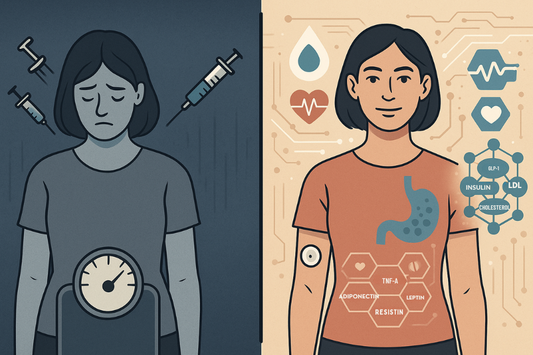MTHFR: is it really the motherf****r gene??!!
Ever felt in a funk and you’re not quite sure why? Low mood, anxiety and depression are of course linked to our circumstances and lifestyle. However, there is also a natural variation in the levels of neurotransmitters that are floating around in our brain. That variation is affected by our genes. The MTHFR is a well studied gene that affects this level.
- The MTHFR gene contains the instructions for the body to make the…
- MTHFR enzyme, which helps the body make active folate…
- Active folate is essential for making dopamine, serotonin and adrenaline.
- Dopamine, serotonin and adrenaline are key chemicals in the brain that affect mood.
Mood altering drugs work by affecting neurotransmitter levels
Both recreational drugs and mood-enhancing medication like antidepressants work by blocking enzymes that remove chemicals like dopamine and serotonin from the brain. A higher level of these chemicals improves mood and can bring about a sense of euphoria or “a high”.
Variations in genetic instructions lead to faster and slower enzymes
Variations in the rate of production and removal of brain chemicals is a major reason why one person’s mental health suffers when another does not. It’s also why some of us suffer more than others.
Imagine you were able to improve your state of mind through nutrition and lifestyle changes without using medication. Changes that help not only today, but also later in life by reducing the likelihood of ill health. This is the study of nutrigenomics.
MTHFR
One gene that is strongly associated with mental health is the MTHFR gene. In fact, some researchers are so convinced of its importance that it has earned the moniker the “motherf****r gene.”
This gene codes for an enzyme called methylenetransferase reductase (“MTHFR”). MTHFR is the enzyme that produces L-methylfolate, which in turn is essential for making neurotransmitters including dopamine and serotonin.
It also does a lot more than that. It plays an important role in detoxification, which is the breakdown of molecules and folate levels in the body. This includes the detoxification of hormones, which if there are problems with its function can cause immune problems and autoimmune disease.
The MTHFR gene has been studied extensively with over 1,800 clinical papers published in the last 10 years.
The importance of folate
Folate is a water soluble B vitamin, also known as vitamin B9. It is mainly found in dark green leaves such as spinach and kale.
Foods often contain a synthetic form of folate, called folic acid, which is found in many supplements and fortified foods. In order to make the building block of protein and DNA, folate is essential.
Folate is also required to convert the amino acid homocysteine to methionine, another amino acid. Amino acids are the building blocks of protein. Methionine is an essential amino acid needed for growth and tissue repair. If the methyl cycle is affected by low levels of folate this results in high levels of homocysteine. Excessive levels of homocysteine are linked to increased risk of heart disease and strokes. This can occur when cells lack folate, as it will impair the conversion of homocysteine to methionine.
In order to prevent homocysteine build up, methylenetetrahydrofolate reductase (MTHFR) is a key enzyme for the metabolism of folate. It triggers the irreversible conversion of folate from one form, 5,10 – methylenetetrahydrofolate (5,10-MTHF) to another form 5-methyltetrahydrofolate (5-MTHF). This conversion is required to convert homocysteine to the essential amino acid methionine.
An overview: genetic variations and how they affect health
Our DNA contains around 20,000 genes. Genes contain instructions for each cell on how to make every structure in the body.
The genes are bunched together to make up chromosomes of which we have 23 pairs, making 46 chromosomes in total.
The reason chromosomes come in pairs is so that the body has two sets of instructions (apart from the sex chromosomes), so if one set is a “dud” it can use the back up. Ideally we want both pairs working because carrying one dud set can sometimes cause issues. If both sets are affected then the impact is more significant.
Imagine the blueprints to your house have a small mistake. It could result in bigger or smaller doors: a small change might mean that they no longer close properly, and so are less efficient. Similarly, an alteration to a gene (the body’s blueprints), called a single nucleotide polymorphism (SNP) can lead to altered bodily structures.
In human terms this could mean:
- A change in the shape of a receptor. Effect: it is less capable of detecting a hormone.
- A change in the shape of an ion channel that partially blocks the channel. Effect: reduced absorption from the gut.
In the case of MTHFR:
- A change in the shape of the enzyme. Effect: slower at making active folate.
As already mentioned, MTHFR is an enzyme that is responsible for processing folate in the human body, which is key for multiple important functions in the brain, heart, DNA and hormone balance.
In the long chain of code that makes up the gene there are actually 34 significant mutations that lead to variations that have been described to date.
However, the one which has been studied most and which seems to have the highest effect on how the enzyme works is referred to as C677T MTHFR.
A single mutation reduces MTHFR enzyme activity by 35%. A double mutation in both copies causes a reduction in activity by 46%. This is compounded if a second mutation at 1298 MTHFR is present, although the latter has minimal impact if C677T is normal.
Knowledge is power. The good news is that these issues can be corrected and rebalanced with diet and supplementation.
What are the symptoms of a slow MTHFR?
Conditions that have a link to a slow MTHFR gene:
- Inflammation. A slow MTHFR is linked to higher levels of inflammation in the body. Long term chronic inflammation can lead to heart problems, autoimmune disease and chronic fatigue. It can lead to cognitive decline and dementia.
- Detoxification problems. Hormones are powerful messengers in the body that switch on and off various functions. When a message has been received, the body removes the hormone in a process called detoxification. If this “off” switch is faulty, hormones can hang around for longer than ideal. This in turn can cause hormonal problems like high oestrogen in PCOS (polycystic ovarian syndrome).
- Anxiety and depression. The MTHFR enzyme is important in maintaining levels of neurotransmitters, such as serotonin and dopamine. A slow MTHFR is linked to a higher risk of low mood.
- Raised homocysteine levels. MTHFR is needed to convert homocysteine back into methionine. Raised homocysteine is independently a risk factor for heart attacks and autoimmune disease.
- Low energy levels. Folate is essential for multiple systems in the body, making DNA and red blood cells are just some of these. Low active folate can lead to lethargy.
Methyl folate NOT folic acid
To balance things use the already active form, methyl folate, but care must be taken to increase these levels slowly along with other B vitamins.
Should I start taking methyl folate?
Well, not so fast! If you increase your ability to “methylate” you can actually go the other way and rapidly produce more chemicals like dopamine. This is called hypermethylation and can cause side effects like irritation, anxiety, hyperactivity, and poor sleep.
For people who have issues with mood and a slow MTHFR we recommend a specially tapered 4 week MTHFR pack. This includes slowly increasing doses of supplements that include other important supporting minerals like magnesium and omega 3 to avoid the side effects of hypermethylation.
The supplements are pre-packed so you don’t need to work out the increasing doses.
How to support a slow MTHFR?
As always, we recommend making sure you get as much as you can from what you eat. In this case, leafy greens like lettuce, spinach and kale, are your friends, but also add in lentils, avocados, broccoli, Brussels sprouts, and asparagus. Try them in raw form because that’s what contains the most folate.
In addition, carefully chosen supplements will provide significant support.
- Support detoxification pathways further down the line to make sure they can handle an upsurge in folate. It is important to do this first before increasing methylation. Do this with: omega 3, NAC (plus zinc and selenium) along with a magnesium supplement. We favour 1000mg of magnesium glycinate.
- Slowly increase active forms of vitamin B over a month.
- Optimise levels of omega 3 and vitamin D.
- Support with betaine and silymarin.
Things that slow down the MTHFR enzyme
- Cholesterol-lowering drugs reduce the absorption of fat soluble vitamins like A,D,E,K. They also reduce folate and B12 levels. A lack of folate increases methylation issues.
- Antacids and acid blockers affect vitamin B12 levels, which is essential for normal methylation. In the US it is now negligent to leave a patient on PPI acid blockers for longer than 4 weeks unless they suffer from Barrett’s oesophagus. Yet in the UK patients are left on them for years.
- Methotrexate is a folate blocker and can cause significant reactions if you have a slow MTHFR.
- Niacin – if you “overmethylate” by taking too much folate too quickly you can slow things by taking niacin.
Here is an example of a tapered MTHFR regime with increasing doses over 28 days:
| Days 1-28 | Days 1-7 | Days 8-14 | Days 15-28 | |
|---|---|---|---|---|
| Omega 3 | B1 thiamine | 15mg | 25mg | 25mg |
| NAC/ glutathione | B2 Riboflavin | 10mg | 10mg | 10mg |
| Magnesium glycinate | B3 Niacin | 20mg | 25mg | 25mg |
| Milk thistle | B5 Pantothenic acid | 20mg | 25mg | 25mg |
| Zinc, selenium | B6 Pyridoxine | 10mg | 10mg | 25mg |
| Vitamin D3 | B12 methyl cobalamin | 250mcg | 500mcg | 500mcg |
| B9 methyl folate | 200mcg | 400mcg | 1000mcg | |
| B7 biotin | 300mcg | 500mcg | 500mcg | |
| Betaine | 450mg | 450mg | 450mg |
Summary
MTHFR is a well-studied gene that has a significant impact on folate in the body. With a balanced diet containing lots of leafy greens the impact on health with the C677T variant can be made minimal.
Problems do arise, however, when those folate levels drop. This can be due to diet or absorption issues. During pregnancy high levels of folate are required so it can be an issue if folate levels are already low.
If you suffer from low mood, have health issues, or raised homocysteine levels, checking your MTHFR is worthwhile.






